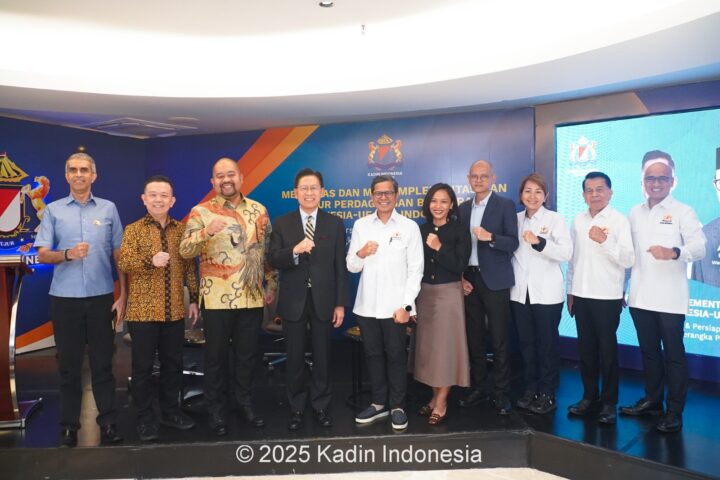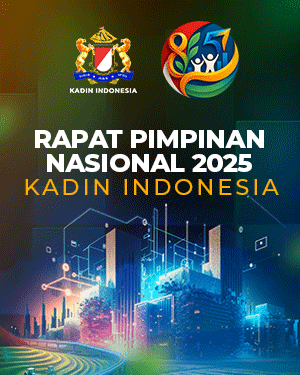
Jakarta - The Indonesian Chamber of Commerce and Industry (Kadin) Indonesia Institute held a Socialization and Preparation Event for the Political Agreement on the IEU-CEPA and the Indonesia–United States (US) Trade Framework, titled “Exploring and Implementing Bilateral Trade Pathways: Indonesia-EU and Indonesia-US”, which took place at Menara Kadin Indonesia, South Jakarta, on Monday (August 4, 2025).
This event aimed to socialize and prepare for the implementation of the Indonesia–European Union Comprehensive Economic Partnership Agreement (IEU-CEPA) as well as the trade framework between Indonesia and the United States.
Speakers at the event included James T. Riady, Coordinator Vice Chairman for International Affairs of Kadin Indonesia; Pahala Mansury, Vice Chairman for Trade and International Agreements of Kadin Indonesia; Arif Havas Oegroseno, Deputy Minister of Foreign Affairs of the Republic of Indonesia; and Djatmiko Bris Witjaksono, Director General of International Trade Negotiation of the Ministry of Trade of the Republic of Indonesia.
In his speech, James T. Riady emphasized that the trade agreement with the European Union marks a new chapter in Indonesia's economic relations with the region.
"With the European Union, we are entering a new era through the Indonesia–CEPA agreement. A bridge that will connect Indonesia's innovation, resources, and skills with the vast European market," said James.
James added that various leading Indonesian products such as palm oil, timber, textiles, electronics, and creative industries will find it easier to penetrate the European market thanks to reduced tariff barriers.
Cooperation with the United States through a reciprocal protection agreement, continued James, is considered important to secure exports and open up opportunities in the advanced technology, critical minerals, and creative industry sectors.
"Trade agreements are not just about tariffs or numbers on paper. These agreements are dreams turning into real opportunities. Let us carry this shared vision to make Indonesia a center of sustainable global trade," said James.
Furthermore, Pahala Mansury explained that almost 99% of Indonesian export commodities to the European Union will receive preferential treatment under the IEU-CEPA framework, with the potential for tariffs to drop to 0%.
"This agreement must be fully optimized, especially because labor-intensive sectors could see their exports to EU member countries increase," said Pahala.
Pahala also highlighted the progress in negotiations with the United States, which have resulted in reciprocal tariffs for Indonesian products dropping from 32% to 19%.
"This is a major advantage for Indonesia, especially when compared to countries like Vietnam, Cambodia, or Bangladesh," he added.
On the same occasion, Mulya Amri, Executive Director of Kadin Indonesia Institute, emphasized that the business sector positively welcomes the opening of various international trade opportunities facilitated by the government. He considers this a strategic opportunity to accelerate Indonesia's economic growth.
"We are very pleased with the opportunities that have been provided. Of course, we need to encourage and energize Indonesian businesses to take advantage of these opportunities. So, when the doors are fully open with the EU and also with the United States later, with clearer details in the agreements, we are already prepared to conduct trade, lift Indonesia's economy, and create more jobs," said Mulya.
Meanwhile, Deputy Minister of Foreign Affairs Arif Havas Oegroseno underlined the importance of diversifying trade partners. Besides Europe and the United States, Indonesia must also begin to seriously expand its economic presence in other regions such as Africa and Latin America.
"North Africa has potential for the fertilizer industry, East Africa needs medicine and vaccines from us, and West and Southern Africa also have high demand for Indonesian products. Their population exceeds one billion this is a massive market," he said.
He added that Indonesia's footprint in Latin America remains small and needs to be strengthened as part of a global market expansion strategy.
Furthermore, Djatmiko Bris Witjaksono, Director General of International Trade Negotiation at the Ministry of Trade, emphasized that the agreement with the European Union demands a high level of readiness, as their standards are far more complex.
"The European Union already has a much more advanced generation of trade agreements compared to Indonesia. While we are just entering the fourth generation, they are already at the seventh or eighth," explained Djatmiko.
As additional information, the signing of the Indonesia–European Union Comprehensive Economic Partnership Agreement (IEU-CEPA) is scheduled for September 2025. This agreement was marked by the signing of an exchange letter on July 13, 2025, in Brussels, Belgium.

National Economy
Regional Economy
National Economy
Regional Economy